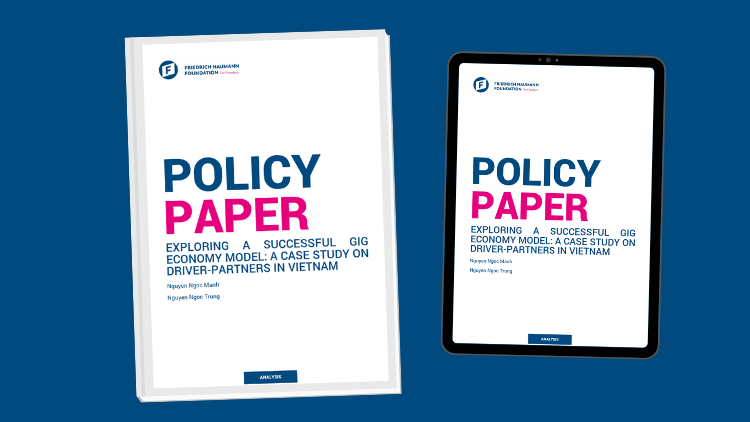Gig Economy
Unlocking the Potential of the Gig Economy: Lessons from Vietnam’s Grab Model

The gig economy is rapidly transforming the global labor market, offering unprecedented flexibility and opportunities for workers and businesses alike. In Southeast Asia, Vietnam has emerged as a vibrant example of this transformation, thanks in large part to the success of Grab’s ride-hailing platform. A new policy paper commissioned by the Friedrich Naumann Foundation for Freedom delves into the dynamics of this model. The authors Nguyen Ngoc Manh and Nguyen Ngoc Trung present key findings and actionable recommendations for policymakers, entrepreneurs, and gig workers.
The Rise of Grab and the Gig Economy in Vietnam
Since its introduction in 2014, Grab has revolutionized transportation and flexible employment in Vietnam. What began as a pilot program has evolved into a crucial part of the country’s urban mobility and digital economy. Grab’s acquisition of Uber’s Southeast Asian operations further cemented its dominance, offering even more Vietnamese workers the chance to participate in the gig economy. Supported by forward-thinking government policies, such as Decree No. 10 and Resolution 52/NQ-TW, the gig model has grown rapidly and now serves as a blueprint for other developing nations.
Drawing on extensive survey data and advanced analytical methods, the policy paper explores what drives success in Vietnam’s gig economy. The research highlights two main factors that significantly influence Grab drivers’ earnings: the adoption of new values (such as flexibility, empowerment, and social connection) and the creation of a new, more dynamic labor market. The data shows that drivers who embrace these values—choosing their hours, maximizing productivity, and building community connections—tend to achieve higher incomes. This shift away from rigid, traditional employment structures is reshaping Vietnam’s economic landscape.
Opportunities and Challenges of the Gig Economy
The gig economy offers clear benefits: increased autonomy, supplemental income, and broader access to work for people of diverse backgrounds. However, the policy paper also addresses important challenges, including legal protections, fair competition, and social welfare for gig workers. While digital platforms like Grab enable efficient service delivery and technological innovation, they also raise questions about job security and worker rights. The paper calls for comprehensive policies that balance innovation and flexibility with robust worker protections, ensuring that the gig economy remains inclusive and sustainable.
The findings offer practical guidance for governments and businesses looking to harness the power of the gig economy. Recommendations include: fostering digital skills, improving regulatory frameworks, ensuring fair competition, and investing in social safety nets. By addressing these areas, Vietnam and other emerging economies can unlock the full potential of gig platforms, driving economic growth while safeguarding worker well-being.
Vietnam’s experience with Grab demonstrates how digital innovation, supportive policy, and community engagement can create a thriving gig economy. This policy paper is essential reading for anyone interested in the future of work in Asia and beyond. For more details you can download the full report below.
You can download the publication here: https://shop.freiheit.org/#!/Publikation/1957
